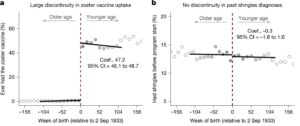Have you ever read a paper with a title that told you what the scientists did, but not what they found? Sure, some great articles are actually about what the scientists did, and we mentioned this in a previous Snippet. But now consider an important new paper in Nature this week. I’ll spoil the ending: the authors report compelling evidence, in older humans, that vaccination against shingles can provide significant protection against dementia. That’s big and exciting news! Why, then, is that news not mentioned in the paper’s title?!

Only the authors can enlighten us, but the likely answer is that while we already have correlative evidence for this connection, there seemed to be no way to rigorously test the hypothesis. We would need an “experiment,” perhaps in the form of a placebo-controlled trial. The authors discovered that a nearly perfect experiment had actually been designed, naturally, when on 1 September 2013 people in Wales became eligible for the vaccine based on their birthday. Everyone born on or before 2 September 1933 was eligible for the vaccine, while everyone younger (by, say, a day) was not. Voila! A large cohort of people, effectively the same age, who differ vastly in vaccination status. And that is what the authors highlight in their title: “A natural experiment on the effect of herpes zoster vaccination on dementia.” What is the effect? You have to read the abstract to find out. I would have encouraged the authors to put the big news in the title, but I admit their title is a sly way to get more people to read beyond the title—a worthy pursuit.
One strong aspect of the paper is its clarity in explaining the big problems with correlative data, in the form of confounders. Here is their second paragraph, which is a model of clear and forceful writing:
To date, studies in cohort and electronic health record data on the effect of vaccination receipt on dementia have simply compared the occurrence of dementia among those who received a given vaccination and those who did not. These studies have to assume that all characteristics that are different between those who are vaccinated and those who are not (and that are also related to dementia) have been sufficiently well measured and modelled in the analysis, such that no factors confound the relationship between vaccination receipt and dementia. This assumption of no confounding bias is often implausible because it has to be assumed that the study has detailed data on factors that are difficult to measure, such as personal motivation or health literacy. It is also an assumption that cannot be empirically verified.
A natural experiment on the effect of herpes zoster vaccination on dementia
In Nature, 2 April 2025
From the group of Pascal Geldsetzer.
Snippet by Stephen Matheson
Image credit: Figure 1 (a and b) from Eyting et al. linked above (CC-BY)